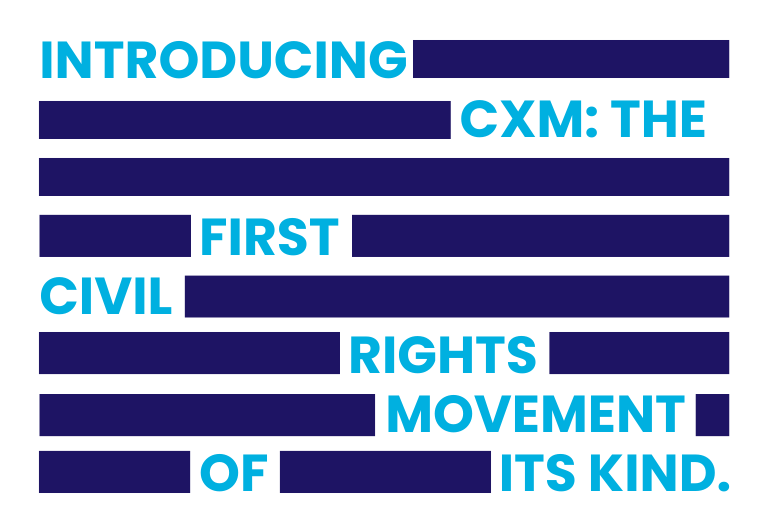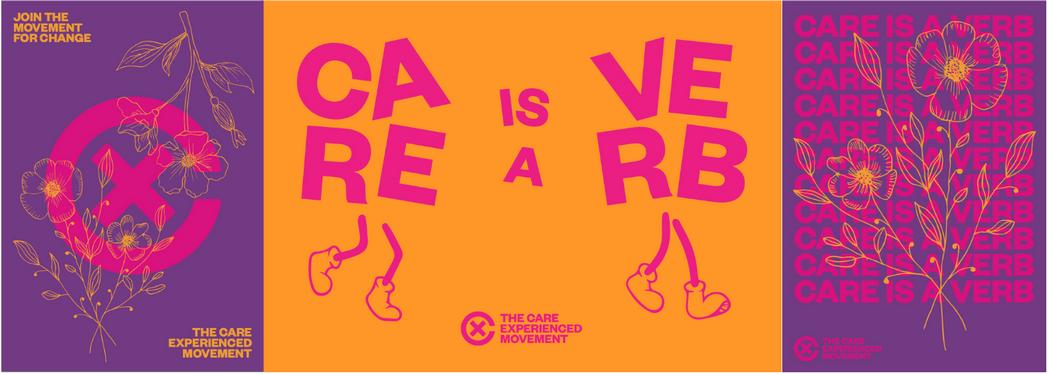Backed by Challenge and Change, Isabelle Kirkham and Rose Regan are leading the world’s first civil rights movement of Care Experienced People.
*the redactions in this story were designed with Rose and Isabelle to reflect a common experience among many care experienced people: the substantial redactions made to their care files which prevent them from knowing their histories.
“The care system as a whole is not for Care Experienced People,” says Isabelle Kirkham, Co-Founder and Co-Lead of the Care Experienced Movement (CXM). “If it was for us, we would come out of the other end of the care system the most perfect human beings in the world with the best parents who gave us everything we need.”
With few opportunities to shape and challenge a system run by “corporate parents”, Isabelle, like too many Care Experienced People, felt that her voice was not being listened to in any meaningful way.
“I realised that there isn’t really an organisation that exists that is led by us and is for us,” she says. “I spoke to lots of different Care Experienced People from a diverse community, people that have grown up in foster care, adoptees, people that have even just had a social worker at home. People of all different intersections come to be care experienced. We are in every corner of the world. I wanted to reclaim what it is to be care experienced and, while we don’t aim to represent Care Experienced People, to have a platform for people to represent themselves.”
Isabelle built CXM after graduating from the Royal Central School of Speech and Drama with a First Class Honours Degree in Drama, Applied Theatre and Education, and was joined shortly thereafter by Co-Founder & Co-Lead Rose Regan.
“The big reason I joined CXM was because Isabelle was the first Care Experienced Person I’ve ever met,” says Rose. “I’d never got involved in anything and Isabelle really informed me of different things I didn’t know about my rights, how social services were supposed to be helping me and the sheer disparity between our two local authorities. When I joined in January 2023, it was very much a case of Isabelle having these brilliant ideas and then I was there to start making them a reality. I began reaching out to local authorities for our first project, which was in response to the Care Review.”
In May 2022, the Government published the final report of an independent review of children’s care within the English Care System. The aim of the review was to create recommendations for creating a system that, among other things, lays the foundations for a good life for those who have been in care. In 2023, the Department for Education released its own response to the review’s recommendations and announced an implementation strategy to transform children’s social care, funded to the amount of £200 million. They also invited feedback and input from people and organisations.
“Through CXM, we’re building a world where we’re more in charge of our care.”
With funding from Challenge and Change, Rose and Isabelle spent April 2023 interviewing forty Care Experienced People aged 13-27 in Brighton and Wolverhampton about the government’s response. Based on these interviews, for which each participant’s time was compensated, the Co-Founders wrote their own report, ‘Our Response to Children’s Social Care: Stable Homes, built on love’.
“The Challenge and Change funding paid for the start of this work with care experienced young people,” says Isabelle. “It’s been really helpful because we’ve been able to hire more people. We’re literally financing curious people to do work. It’s really made a difference in us being in those spaces and accessing training so we can function in our roles. It’s been so impactful for me because you’ve got a bunch of kids and people who have traumas that are going to come up and Blagrave just got that and understood that.”
“That funding is what meant Isabelle could hire someone like me, so I’d say it was life changing on a personal level,” adds Rose, who also runs their own small craft business, having finished college with a distinction in Fashion and Textiles. “I was able to leave a job where I was working ridiculous hours. I was up at 4.30 every morning and finished at 9.30 so me and my husband were up at ridiculous hours trying to navigate that and having a year old baby- I have three kids in total. Blagrave being able to give us this funding has meant that I can have a normal job title, I’m able to work from home and actually see my daughter grow up. I really like the fact that I am a pangender, pansexual, queer, neurodivergent person who’s in a lead role. I like the fact that my daughter is going to grow up knowing that I’ve done this and that I’m someone that she can look up to.”
In July 2023, Isabelle and Rose incorporated a CIC, deepening their work to create vital infrastructure for Care Experienced People to lead change in whatever form they believe it should take. Guided by an active Steering Board of “critical friends”, CXM delivers an expansive and ever-developing programme of work, including collaborations on frontline social work and training with organisations including TACT, Frontline, Missing People and a residential care home.
“We’re fully led by Care Experienced People,” explains Rose. “Everyone who works in this space has experience in one way or another. We never ask people to share what their care experience story is or how they became care experienced. You’re welcome in this space to help us shape the movement. We’re a platform for Care Experienced People to reclaim control of their history, their story.
When I was sixteen and went into care, my foster Mum brought me downstairs and told me I had a LAC Review. No one taught me what that meant. It means ‘looked after child’, but I went into this meeting thinking it was about what I was lacking in, failing in, where I needed improvement. I started to realise that, while my care experience was relatively easy, there is still stuff I need to speak out about. Through CXM, we’re building a world where we’re more in charge of our care. I want people to take away the fact that we’re the experts. I want people to reach out and say ‘hey, how can we work together? Could you explain to us how to move away from terminology like LAC Reviews?’
It’s been a real eye-opener about just how different everyone’s care experience has been and how different it varies from local authorities to even age brackets. We have such an intergenerational Steering Board and we bring such a wide range of experiences and ideas and ideologies; so much more than just our care experience. We’re focusing on what assets people bring and what they want to do in life. One of our Board members said they want to use this work as a stepping-stone on their CV. That’s cool. That’s what the movement’s here for: to get further in life and achieve your goals. If somebody comes to us with a campaign, we can support them to run it and platform it. Our big goal is to offer resources and funding for Care Experienced People to make change for themselves ”
“It’s less about us getting a seat at the table and more about us making the table and inviting people to sit with us.”
Crucially, CXM describes itself as a civil rights movement and works within a rights-based framework: the first of its kind in the world.
“There’s never been a movement of people coming together to reclaim what care experience is in history,” says Isabelle. “At least in England, there’s never been a march. There’s never been a rally. There’s never been a citizen assembly. Being care experienced is fundamentally political and civil rights based. In order for us to achieve change, it needs to be led by those with lived experience.”
“We’re not just doing more political stuff but we’re also coming back to the roots, to the creative aspects,” adds Rose. “I’m currently running a granny square blanket crochet project and, after speaking to our Board recently, quite a few of them said it’s really cool that we’re doing something creative because our creativity is stifled at such a young age as Care Experienced People because we don’t have the opportunities. Local authorities concentrate on us getting jobs and work experience, the more practical elements of life, and we don’t just get to sit down and be creative or work in an artistic manner that’s good for the brain. We’re really creative and want to reclaim that.”
One member of CXM has suggested creating a storytelling project through which Care Experienced People might share their stories in an exhibition or public event.
“I do theatre and I’m interested in finding a way to work with Care Experienced People to write speeches and monologues and learn how to perform them,” says Isabelle. “The main point is for our voices to actually be heard, listened to and acted on. A lot of listening happens but nothing ever comes out of that. It’s less about us getting a seat at the table and more about us making the table and inviting people to sit with us at it. On a personal level, I’m very bored of being invited places and being the only care experienced person in the room.”
Recently, CXM’s Steering Board agreed to prioritise work that challenges stereotypes about Care Experienced People, targeting the Foundling Museum, in particular. Located in Brunswick Square, London, the museum shares the story of the UK’s first care home for children, the Foundling Hospital, which was established in 1739. In one exhibit, visitors to the museum can dress as a Care Experienced child.
“It makes us really uncomfortable because you can go and dress up and experience the trauma of being care experienced for fun,” says Isabelle. “The Foundling Hospital was the first children’s home to exist so it should be accessible for kids and adults to go and learn about their history, but it’s not accessible if you visit and see people dressing up as you. It’s not a nice space. We’re writing a collective letter to the Foundling Museum to ask them to remove that and work with them so that the exhibits aren’t harmful. ”
Currently, CXM is planning its first major rally and convention for the 27th April, 2024, to which all Care Experienced People are invited to attend, pitch up stalls and speak.
“Care Experienced People are the most powerful people when they’re given the tools, resources and support,” says Isabelle. “We’re always going to be powerful. We have the answers to what’s going to make the care system the best thing it needs to be because we’ve lived it, we’ve grown up in it. We know people that are still in the system. We’re building a world that not only improves the care system, but has a lifelong impact on all Care Experienced People; one that values, understands and celebrates the experience of growing up in Care.”
—
You can connect with CXM on X or via the contact form on their website.
CXM is seeking sponsors and funders for the Care Experienced Rally 2024. If you would like to donate, you can do so via Open Collective.
—
The Challenge and Change Fund is designed by young changemakers for young changemakers. It funds young people directly, supporting them to create the change they want to see. It prioritises young people who are emergent and have lived experience of the injustices they are trying to change, supporting youth led collectives, social enterprises and CICs across England. You can read more about Challenge and Change here.


